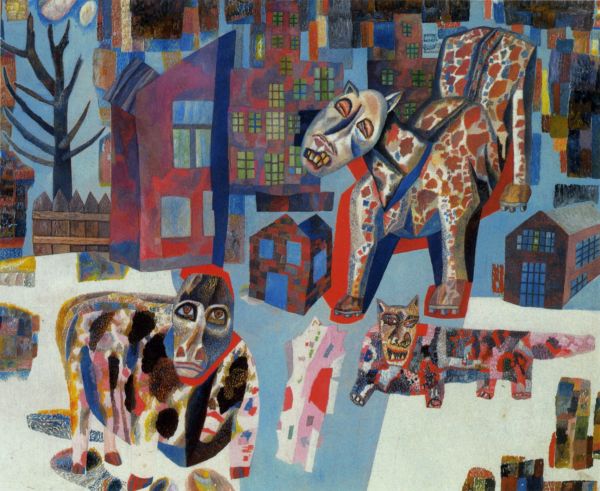|
|
Animals. 1925–26

Filonov Pavel,
Oil on canvas
36 x 44
Annotation
Pavel Filonov had a pantheistic relationship with the world. The artist believed that people, animals and plants were equally important; all were products of the one matter and of the one origin. His dreams of an harmonic and spiritual union of man and nature were expressed in sublime artistic images in such early works as Shrovetide and Dairy Maids. Notes of alarm, perturbation and drama then began to creep into Filonov’s compositions in the 1930s.
Endowed with psychological characteristics and the ability to experience emotions, strange and enwildened beasts with human heads wander the indefinite space of Animals. The combination of archaism, the fantastic and the artist’s anthropomorphic perception of nature impart an unexpected and convincing poignancy to the image. The almost intelligent looks in the animals’ eyes conjure up associations with lost human souls.
Author's Biography
Filonov Pavel
Filonov, Pavel Nikolaevich
1882/83, Moscow -1941, Leningrad
Painter, graphic artist, theatrical designer, poet. Studied at painting studios in St Petersburg (1897-1901), Lev Dmitriyev-Kavkazsky''s studio (1913-08), School of Drawing, Society for the Encouragement of Artists (1893-1901) and under Vasily Savinsky and Jan Ciaglinskj at the Higher School of Art, Imperial Academy of Arts (1908-10). Contributed to exhibitions (from 1910). Founding member of the Union of Youth (1910). Founded the Made Pictures studio of painters and draughtsmen and published its manifesto (1914; second version published in 1923). Helped to design the sets and costumes for a production of Vladimir Mayakovsky: A Tragedy (1913). Wrote the poem Chant of Universal Flowering (1914-15). Headed the Department of General Ideology at the Museum of Artistic Culture (1923). Helped to write the statute of the Institute of Artistic Culture. Formed the Masters of Analytical Art (1923).

